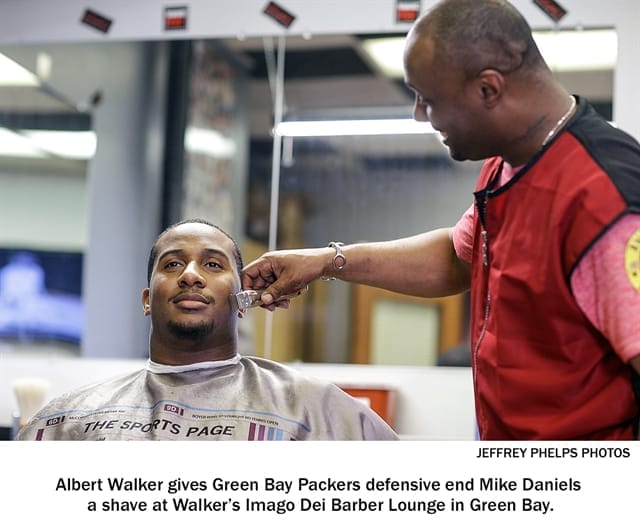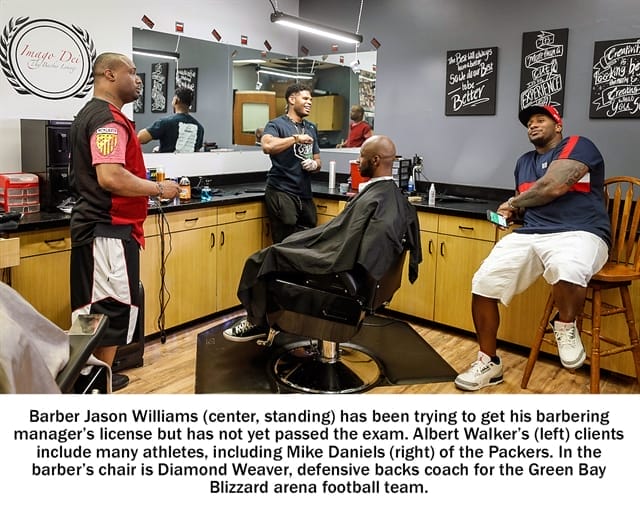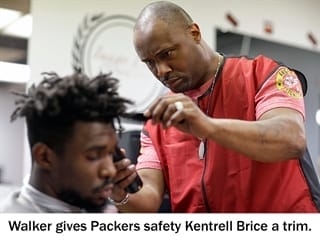Albert Walker, whose clients include many Packers players, has years of experience but can’t run his own shop
Editor’s Note: On Nov. 27, 2017, Gov. Scott Walker signed into law licensure reforms that removed separate licensing requirements for barbers and cosmetologists who want to become managers.
Watch video of Albert Walker’s story here.
Part of a series of WPRI stories and research on the issue of professional licensing in Wisconsin.
Green Bay — The players, Green Bay Packers who could get their hair cut anywhere by anyone, choose to slip quietly through the side door of Albert E. Walker’s barbershop.
A few come as often as every two weeks. The stars come weekly during the season so they’ll always be camera-ready.
Most come for one or all of three reasons:
• Walker and his two partner-barbers give them the latest styles, and they do it with precision.
• The shop offers clients an “experience”: televisions tuned to sports channels, a pool table, dartboard, drum set, lounge area — and priceless privacy for the athletes who make Green Bay famous.
• Most important, especially to Packers defensive end Mike Daniels, that experience comes with a dose of what he calls “spiritual rejuvenation.”
Walker, an ordained minister, talks to most of the players about Jesus and leading a life that is “right with the Lord.”
He’s been barber to a who’s who of Green Bay Packers, past and present, including Randall Cobb, Ha Ha Clinton-Dix, Nick Perry, LaDarius Gunter, B.J. Raji, Nick Barnett and Daniels, at whose wedding Walker officiated.
Yet, despite his faithful following, almost two decades of cutting hair and a Wisconsin barber’s license that required 1,000 hours of training in a school licensed by the state, plus passing the exam, Walker cannot open his shop to the public.
He’s missing one thing: a state barbering manager’s license.
Walker says he can’t afford the tuition for the manager’s classes, which can run as high as $20,000.
State law allows a barbering manager applicant with 2,000 hours of licensed practice to forgo the required 150 hours of instruction, but in exchange, he or she must work 4,000 hours under the supervision of a licensed manager — an unnecessary, impractical and nearly impossible hurdle.
Walker likely has put in tens of thousands of hours behind the chair, but most of those hours don’t count for licensing purposes.
By contrast, Wisconsin requires only 180 hours of training for emergency medical technicians.
Emerging from time behind bars
Walker learned his trade in the 1990s while incarcerated in Joliet, Ill. A gang member on the streets of Chicago from a young age, he was serving time for “a couple of attempted murders” and kidnapping. He also had drug and auto theft convictions and spent most of the ’90s behind bars.
“I should be dead 90 times over,” Walker says of his days in the gang.
In prison, he found he had a knack for cutting hair. He also found faith through an influential Christian mentor who helped him break free from his criminal past.
When Walker was released from prison, he attended a barber college in Chicago and worked for a well-known shop on the west side for three years. In the early 2000s, he moved to Wisconsin and cut hair in the shadows without a barber’s license.
He got involved with the ministry-based Captive Project in Milwaukee, mentoring young people, teaching many of them his craft. Walker moved to Green Bay and now serves as minister of the program there.
He attended the Paul Mitchell Beauty School in Green Bay and obtained his Wisconsin barber’s license last July.
He immediately leased a space in an office building here and opened Imago Dei Barber Lounge. (Imago Dei means “image of God.”) The sprawling venue has several chairs in the front area, while the VIP room for his player-clients is toward the back.
When he first tried to open the shop, Walker had a partner with the required barbering manager’s license. “But he backed out and left me with a signed lease,” says Walker, who pays $2,000 monthly for the space.
The business couldn’t open.
“I tell everybody I cut hair for free,” Walker says. “If they decide to give me (a tip), they do, but for right now I am just cutting particular clients. I’m not taking any new clients.”
The quest for a manager
Walker has a new partner, fellow licensed barber Jason Williams, whom Walker is counting on to serve as the establishment’s manager.
It will take about two years of working under Williams’ supervision — as well as passing the exam — for Walker to meet the state requirement for becoming a barbering manager himself.
There’s one big hitch, though.
Williams has taken the manager’s exam four times but has yet to pass. He recently took it for a fifth time and is awaiting the result.
“I’ve gotten the same score each time, 70 percent. You need 75 percent” to pass, Williams says. “The parts I always fail are the ones where I have never seen a book” that covers the topics.
Williams says the private company that administers the test for Wisconsin “can’t even tell you what to study.”
“There are no pre-tests, no study materials,” he says, adding that the part of the test he continually fails is based on a book published in 2004. Very recently, Williams got his hands on a copy of the 13-year-old book and read it before his fifth attempt.
Williams says he cannot afford the nearly $20,000 for manager’s school. He does, however, have the required 2,000 hours working under the supervision of a licensed manager.
“I’m at least $1,500 in” traveling to different cities to take the exam and associated costs, Williams says of his first four attempts.
Walker calls it “insulting” to have his level of experience and skill and not be able to run his own shop.
“I’ve got to go pay somebody else with less experience than me to manage my shop. I went to school, I paid my dues, I worked hard, no loans, started this business with money out of my own pocket. My hands are tied, and it feels like I’m drowning,” he says.
“A lot of this red-tape stuff, all it does is restrict guys like me, and … we give up. And we end up going back to prison,” Walker adds.
Obstacles for ex-offenders
The married father of six also worries that his status as a convicted felon may keep him from obtaining the manager’s license.
The Wisconsin Department of Safety and Professional Services website, describing the application process, states that “applicants with convictions” may be subject to further review. A review could delay licensing by about a month. And, if it is determined that the applicant “needs to appear before the board,” the process may take up to an additional three months.
For a state government that touts business and job growth, the laws restricting some professions are daunting, Walker says.
It is even harder for an ex-offender, he says, despite lawmaker efforts to implement more and better programs aimed at getting ex-offenders and minorities into good jobs and their own businesses.
There’s a disconnect, he says. The licensing requirements “are hindering the craft in this state.”
“Being a felon just adds unbelievable pressure,” Walker says. “We’re trying to assimilate into society. We’re trying to do everything they tell us to do, but then, here’s another roadblock.
“A talented young man like myself that’s got all the right stuff, I can’t make it. And then to be a felon on top of it, I can’t make it.
“That’s a hard thing to swallow.”
Wisconsin is one of only five states to require a “higher-level” license in some occupations for people to manage their own business, says Kyle Koenen, aide to state Sen. Chris Kapenga (R-Delafield), who has introduced legislation to eliminate some of the onerous licensing requirements. That would allow Walker to manage his own shop.
“This (manager’s) license is a real barrier to salon owners and budding entrepreneurs from setting up their own business. Salons would still be required to designate a manager, but there would simply not be a license to be a manager,” Koenen says of the legislation being considered in Madison.
Walker ‘deserves community support’
Daniels calls Walker a valuable member of the community.
“He loves this community,” Daniels says. “He’s very instrumental in helping a lot of young men and women get their lives together,” he says. “Albert works in the forgotten areas of the city. He has an extremely loving heart.”
Jermaine Whitehead, a young safety who joined the Packers last year, was in Walker’s barber chair on a recent day in May. He was introduced to Walker not long after he landed in Titletown.
He calls Walker “a great friend and a great barber” and says he patronizes Imago Dei because “I can be normal here.”
Daniels considers Walker “an older brother and a spiritual leader in my life.”
“Everybody’s made mistakes in their lives. Albert has definitely made the most out of his second chance. You don’t see many men who have been through what he’s been through and come to owning their own barbershop.”
Walker’s past should not be held against him, Daniels says.
“I’ve seen where he’s used that knowledge to help other young men not make the same mistakes that he has made,” Daniels says. “He does that directly through his mentorship in life, with the Bible, and, with being a barber, he has taught a lot of people how to cut hair.”
Daniels says he enters Walker’s shop for a haircut and leaves “filled with spirit.” That, he says, is not a bad thing in a world that is sometimes filled with struggle and misery.
“He’s stuck to his dreams and his goals,” Daniels says. “He deserves community support.”
And a little freedom from state regulations that are preventing those dreams and goals from becoming reality.
Betsy Thatcher of Menomonee Falls is a freelance writer and a former Milwaukee Journal Sentinel reporter.
Read WPRI’s “Government’s Love for Licensure” report here.
Watch video of Krissy Hudack’s story here.
Watch video of Cassie Mrotek’s story here.








